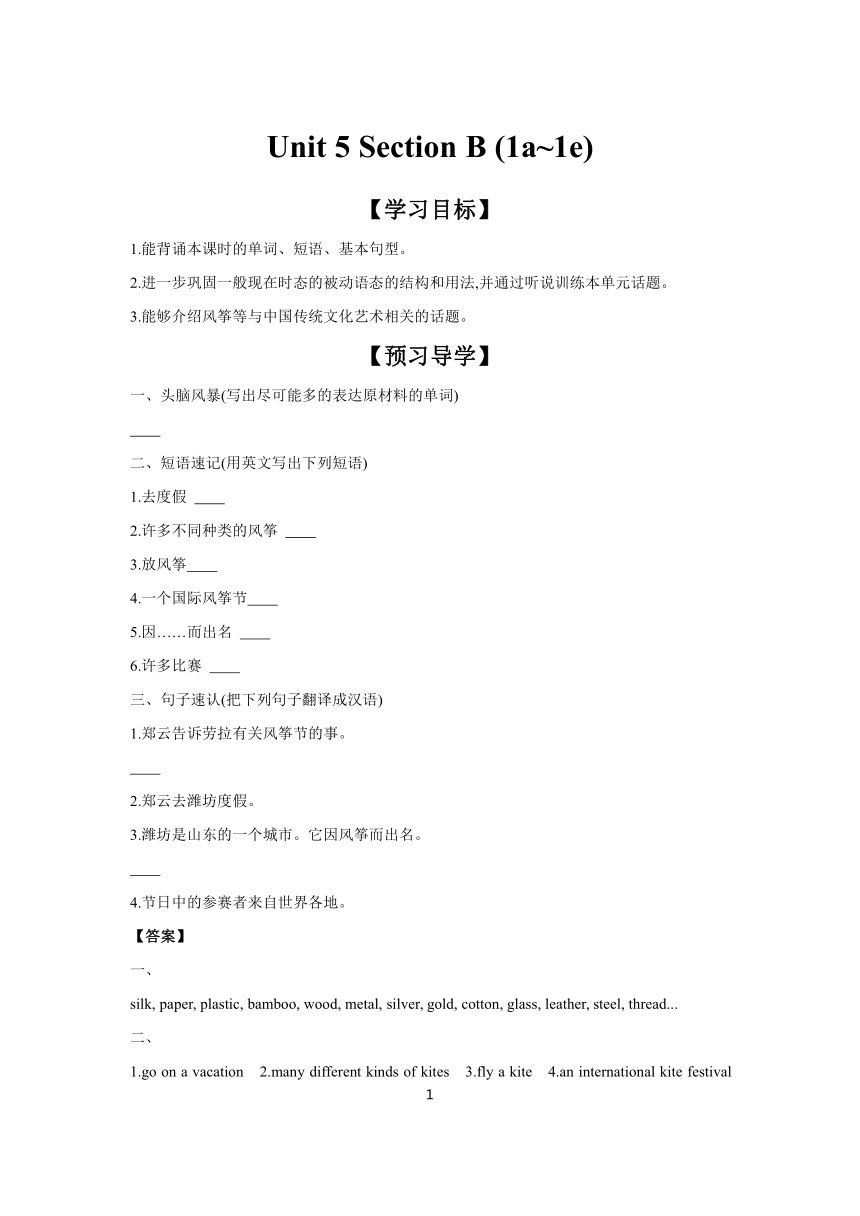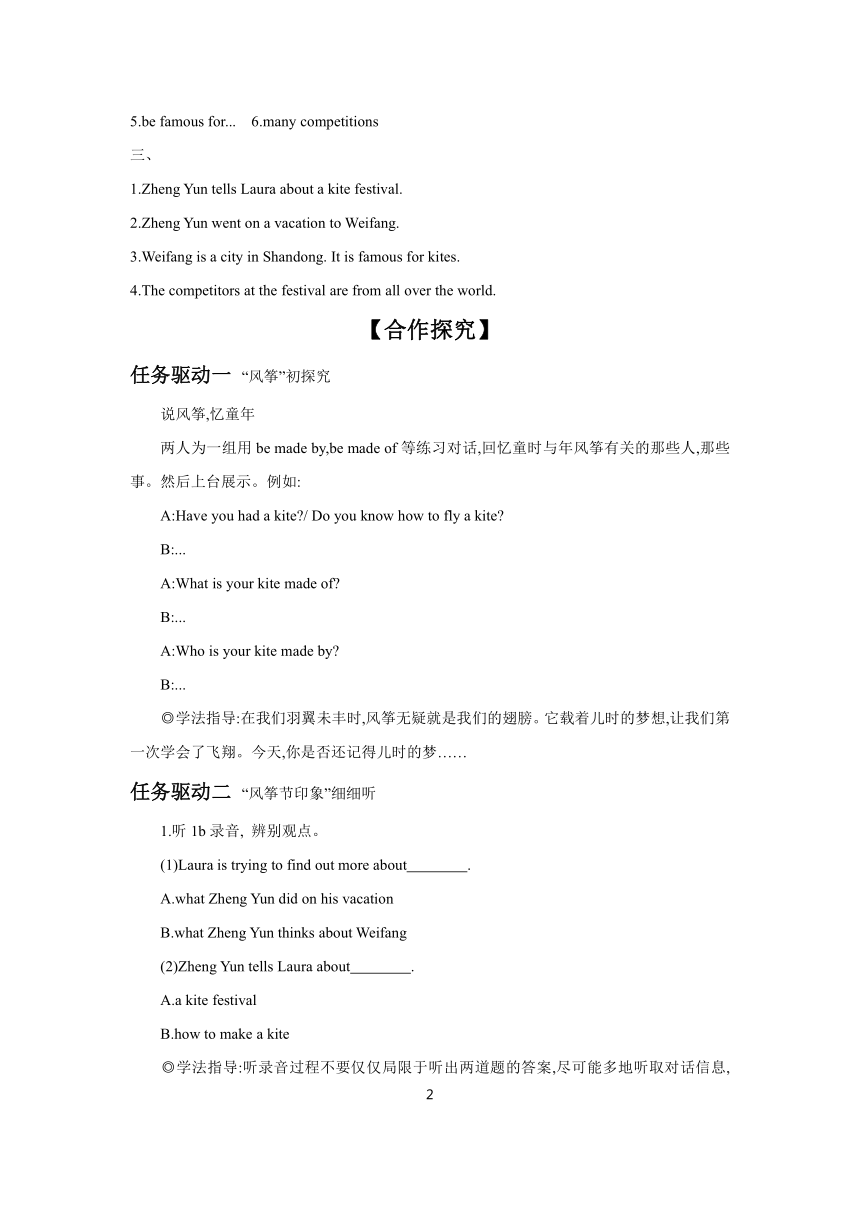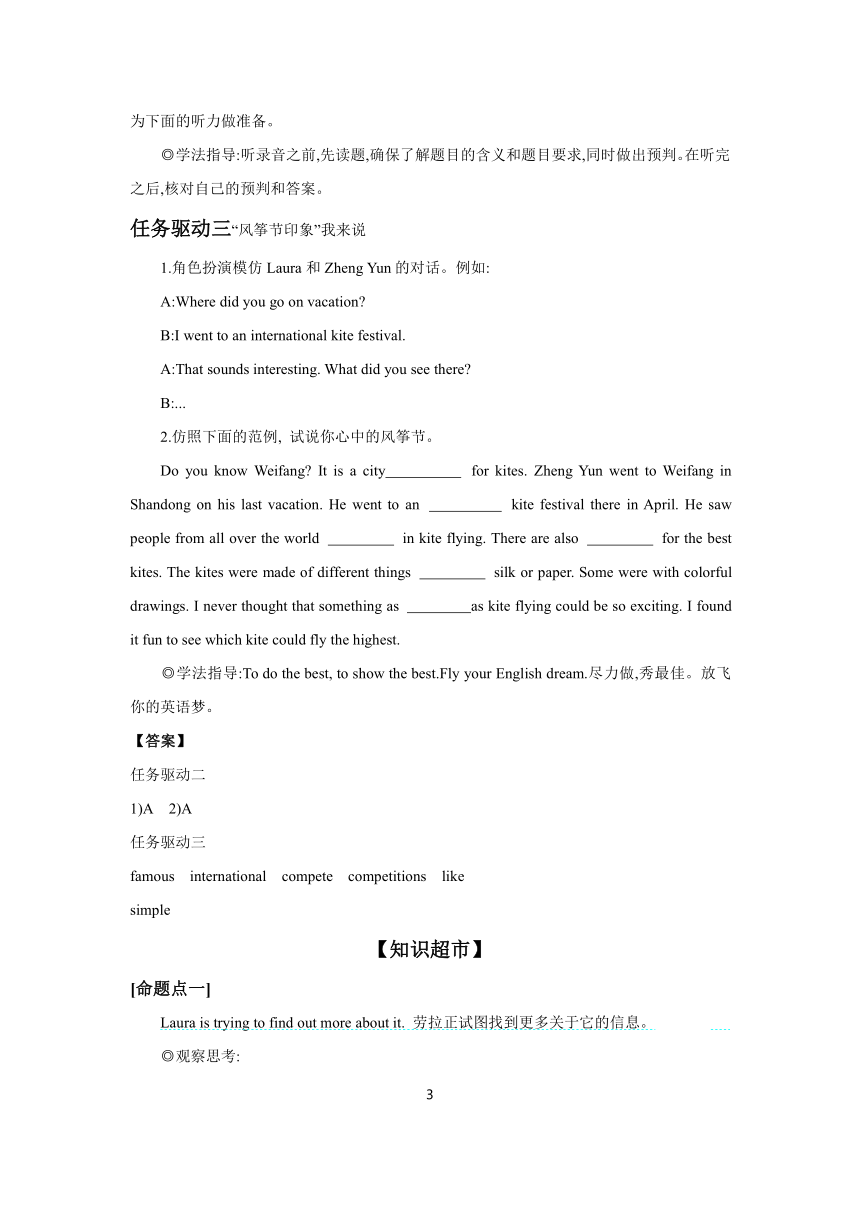Unit 5 What are the shirts made of?Section B (1a~1e) 学案 人教版九年级全一册(含答案)
文档属性
| 名称 | Unit 5 What are the shirts made of?Section B (1a~1e) 学案 人教版九年级全一册(含答案) |  | |
| 格式 | docx | ||
| 文件大小 | 25.3KB | ||
| 资源类型 | 教案 | ||
| 版本资源 | 人教新目标(Go for it)版 | ||
| 科目 | 英语 | ||
| 更新时间 | 2024-02-21 16:44:36 | ||
图片预览



文档简介
Unit 5 Section B (1a~1e)
【学习目标】
1.能背诵本课时的单词、短语、基本句型。
2.进一步巩固一般现在时态的被动语态的结构和用法,并通过听说训练本单元话题。
3.能够介绍风筝等与中国传统文化艺术相关的话题。
【预习导学】
一、头脑风暴(写出尽可能多的表达原材料的单词)
二、短语速记(用英文写出下列短语)
1.去度假
2.许多不同种类的风筝
3.放风筝
4.一个国际风筝节
5.因……而出名
6.许多比赛
三、句子速认(把下列句子翻译成汉语)
1.郑云告诉劳拉有关风筝节的事。
2.郑云去潍坊度假。
3.潍坊是山东的一个城市。它因风筝而出名。
4.节日中的参赛者来自世界各地。
【答案】
一、
silk, paper, plastic, bamboo, wood, metal, silver, gold, cotton, glass, leather, steel, thread...
二、
1.go on a vacation 2.many different kinds of kites 3.fly a kite 4.an international kite festival 5.be famous for... 6.many competitions
三、
1.Zheng Yun tells Laura about a kite festival.
2.Zheng Yun went on a vacation to Weifang.
3.Weifang is a city in Shandong. It is famous for kites.
4.The competitors at the festival are from all over the world.
【合作探究】
任务驱动一 “风筝”初探究
说风筝,忆童年
两人为一组用be made by,be made of等练习对话,回忆童时与年风筝有关的那些人,那些事。然后上台展示。例如:
A:Have you had a kite / Do you know how to fly a kite
B:...
A:What is your kite made of
B:...
A:Who is your kite made by
B:...
◎学法指导:在我们羽翼未丰时,风筝无疑就是我们的翅膀。它载着儿时的梦想,让我们第一次学会了飞翔。今天,你是否还记得儿时的梦……
任务驱动二 “风筝节印象”细细听
1.听1b录音, 辨别观点。
(1)Laura is trying to find out more about .
A.what Zheng Yun did on his vacation
B.what Zheng Yun thinks about Weifang
(2)Zheng Yun tells Laura about .
A.a kite festival
B.how to make a kite
◎学法指导:听录音过程不要仅仅局限于听出两道题的答案,尽可能多地听取对话信息,为下面的听力做准备。
◎学法指导:听录音之前,先读题,确保了解题目的含义和题目要求,同时做出预判。在听完之后,核对自己的预判和答案。
任务驱动三“风筝节印象”我来说
1.角色扮演模仿Laura和Zheng Yun的对话。例如:
A:Where did you go on vacation
B:I went to an international kite festival.
A:That sounds interesting. What did you see there
B:...
2.仿照下面的范例, 试说你心中的风筝节。
Do you know Weifang It is a city for kites. Zheng Yun went to Weifang in Shandong on his last vacation. He went to an kite festival there in April. He saw people from all over the world in kite flying. There are also for the best kites. The kites were made of different things silk or paper. Some were with colorful drawings. I never thought that something as as kite flying could be so exciting. I found it fun to see which kite could fly the highest.
◎学法指导:To do the best, to show the best.Fly your English dream.尽力做,秀最佳。放飞你的英语梦。
【答案】
任务驱动二
1)A 2)A
任务驱动三
famous international compete competitions like
simple
【知识超市】
[命题点一]
Laura is trying to find out more about it. 劳拉正试图找到更多关于它的信息。
◎观察思考:
He looked for his pen all day, but he didn't find it. 他找了一整天钢笔, 但是没有找到。
◎用法总结:find, find out与look for的辨析
find 意为“找到”, 强调寻找的结果。还可以指“发现;碰到”, 多指偶然发现, 后接名词、复合结构或that从句
find out 意为“了解;查明;弄清楚;找到”等, 指通过观察、探索而发现事实的真相、实情, 调查找出原因, 或发现秘密、错误等; 一般接名词、代词或从句
look for 意为“寻找”, 强调寻找的动作
对点自测
用find,find out或look for填空
1.The teacher wants to who broke the window.
2.—Please these new words in the dictionary.
—OK.
3.I am my keys because it isn't in my backpack.
4.I it hard to believe.
[命题点二]
how to make a kite如何制作风筝
how to make a kite 是疑问词+动词不定式的结构,可在句中担任多种成分。
例如:Can you tell me how to get to the railway station 你能告诉我怎样到达火车站吗 (作宾语)
Where to go is still a question. 去哪里还是个问题。(作主语)
The question is how to learn English well. 问题是怎样学好英语。(作表语)
【拓展】1.“特殊疑问词+动词不定式”这种结构可以把复合句转为简单句。
例如:I don't know what I'll do next. = I don't know what to do next.我不知道接下来该做什么。
2.“特殊疑问词+动词不定式”这种结构可构成独立问句。
例如:How to get rid of the trouble 如何摆脱困境
对点自测
单项选择。
( )1.—I plan Hong Kong this winter vacation. What about you
—I can't decide where .
A.to visit; to go
B.visit; go
C.visiting; going
D.to visit; going
( )2.—I don't know do when I meet problems.
—You should ask your net friend for help.
A.when to
B.where to
C.how to
D.what to
[命题点三]
The competitors at the festival are from all over the world.节日上的参赛者来自世界各地。
◎观察思考:
1.The two teams compete for the championship. 那两个队争夺冠军。
2.Who was the winner in the singing competition 谁是歌咏比赛的获胜者
◎用法总结:
compete 动词, 意为“竞争;对抗;比赛”
competitor 名词, 意为“参赛者;竞争者”
competition 名词, 意为“比赛;竞争”
对点自测
用compete, competitor, competition填空
1.We are strong enough to with the best team.
2.There will be an international next week in Shanghai.
3.That big company is the biggest for us. We have made good preparations.
【答案】
命题点一
对点自测
1.find out 2.find out 3.looking for 4.find
命题点二
对点自测
1.compete 2.competition 3.competitor
2
【学习目标】
1.能背诵本课时的单词、短语、基本句型。
2.进一步巩固一般现在时态的被动语态的结构和用法,并通过听说训练本单元话题。
3.能够介绍风筝等与中国传统文化艺术相关的话题。
【预习导学】
一、头脑风暴(写出尽可能多的表达原材料的单词)
二、短语速记(用英文写出下列短语)
1.去度假
2.许多不同种类的风筝
3.放风筝
4.一个国际风筝节
5.因……而出名
6.许多比赛
三、句子速认(把下列句子翻译成汉语)
1.郑云告诉劳拉有关风筝节的事。
2.郑云去潍坊度假。
3.潍坊是山东的一个城市。它因风筝而出名。
4.节日中的参赛者来自世界各地。
【答案】
一、
silk, paper, plastic, bamboo, wood, metal, silver, gold, cotton, glass, leather, steel, thread...
二、
1.go on a vacation 2.many different kinds of kites 3.fly a kite 4.an international kite festival 5.be famous for... 6.many competitions
三、
1.Zheng Yun tells Laura about a kite festival.
2.Zheng Yun went on a vacation to Weifang.
3.Weifang is a city in Shandong. It is famous for kites.
4.The competitors at the festival are from all over the world.
【合作探究】
任务驱动一 “风筝”初探究
说风筝,忆童年
两人为一组用be made by,be made of等练习对话,回忆童时与年风筝有关的那些人,那些事。然后上台展示。例如:
A:Have you had a kite / Do you know how to fly a kite
B:...
A:What is your kite made of
B:...
A:Who is your kite made by
B:...
◎学法指导:在我们羽翼未丰时,风筝无疑就是我们的翅膀。它载着儿时的梦想,让我们第一次学会了飞翔。今天,你是否还记得儿时的梦……
任务驱动二 “风筝节印象”细细听
1.听1b录音, 辨别观点。
(1)Laura is trying to find out more about .
A.what Zheng Yun did on his vacation
B.what Zheng Yun thinks about Weifang
(2)Zheng Yun tells Laura about .
A.a kite festival
B.how to make a kite
◎学法指导:听录音过程不要仅仅局限于听出两道题的答案,尽可能多地听取对话信息,为下面的听力做准备。
◎学法指导:听录音之前,先读题,确保了解题目的含义和题目要求,同时做出预判。在听完之后,核对自己的预判和答案。
任务驱动三“风筝节印象”我来说
1.角色扮演模仿Laura和Zheng Yun的对话。例如:
A:Where did you go on vacation
B:I went to an international kite festival.
A:That sounds interesting. What did you see there
B:...
2.仿照下面的范例, 试说你心中的风筝节。
Do you know Weifang It is a city for kites. Zheng Yun went to Weifang in Shandong on his last vacation. He went to an kite festival there in April. He saw people from all over the world in kite flying. There are also for the best kites. The kites were made of different things silk or paper. Some were with colorful drawings. I never thought that something as as kite flying could be so exciting. I found it fun to see which kite could fly the highest.
◎学法指导:To do the best, to show the best.Fly your English dream.尽力做,秀最佳。放飞你的英语梦。
【答案】
任务驱动二
1)A 2)A
任务驱动三
famous international compete competitions like
simple
【知识超市】
[命题点一]
Laura is trying to find out more about it. 劳拉正试图找到更多关于它的信息。
◎观察思考:
He looked for his pen all day, but he didn't find it. 他找了一整天钢笔, 但是没有找到。
◎用法总结:find, find out与look for的辨析
find 意为“找到”, 强调寻找的结果。还可以指“发现;碰到”, 多指偶然发现, 后接名词、复合结构或that从句
find out 意为“了解;查明;弄清楚;找到”等, 指通过观察、探索而发现事实的真相、实情, 调查找出原因, 或发现秘密、错误等; 一般接名词、代词或从句
look for 意为“寻找”, 强调寻找的动作
对点自测
用find,find out或look for填空
1.The teacher wants to who broke the window.
2.—Please these new words in the dictionary.
—OK.
3.I am my keys because it isn't in my backpack.
4.I it hard to believe.
[命题点二]
how to make a kite如何制作风筝
how to make a kite 是疑问词+动词不定式的结构,可在句中担任多种成分。
例如:Can you tell me how to get to the railway station 你能告诉我怎样到达火车站吗 (作宾语)
Where to go is still a question. 去哪里还是个问题。(作主语)
The question is how to learn English well. 问题是怎样学好英语。(作表语)
【拓展】1.“特殊疑问词+动词不定式”这种结构可以把复合句转为简单句。
例如:I don't know what I'll do next. = I don't know what to do next.我不知道接下来该做什么。
2.“特殊疑问词+动词不定式”这种结构可构成独立问句。
例如:How to get rid of the trouble 如何摆脱困境
对点自测
单项选择。
( )1.—I plan Hong Kong this winter vacation. What about you
—I can't decide where .
A.to visit; to go
B.visit; go
C.visiting; going
D.to visit; going
( )2.—I don't know do when I meet problems.
—You should ask your net friend for help.
A.when to
B.where to
C.how to
D.what to
[命题点三]
The competitors at the festival are from all over the world.节日上的参赛者来自世界各地。
◎观察思考:
1.The two teams compete for the championship. 那两个队争夺冠军。
2.Who was the winner in the singing competition 谁是歌咏比赛的获胜者
◎用法总结:
compete 动词, 意为“竞争;对抗;比赛”
competitor 名词, 意为“参赛者;竞争者”
competition 名词, 意为“比赛;竞争”
对点自测
用compete, competitor, competition填空
1.We are strong enough to with the best team.
2.There will be an international next week in Shanghai.
3.That big company is the biggest for us. We have made good preparations.
【答案】
命题点一
对点自测
1.find out 2.find out 3.looking for 4.find
命题点二
对点自测
1.compete 2.competition 3.competitor
2
同课章节目录
- Unit 1 How can we become good learners.
- Section A
- Section B
- Unit 2 I think that mooncakes are delicious!
- Section A
- Section B
- Unit 3 Could you please tell me where the restroom
- Section A
- Section B
- Unit 4 I used to be afraid of the dark.
- Section A
- Section B
- Unit 5 What are the shirts made of?
- Section A
- Section B
- Review of Units 1-5
- Unit 6 When was it invented?
- Section A
- Section B
- Unit 7 Teenagers should be allowed to choose their
- Section A
- Section B
- Unit 8 It must belong to Carla.
- Section A
- Section B
- Unit 9 I like music that I can dance to.
- Section A
- Section B
- Unit 10 You're supposed to shake hands.
- Section A
- Section B
- Review of Units 6-10
- Unit 11 Sad movies make me cry.
- Section A
- Section B
- Unit 12 Life is full of the unexpected
- Section A
- Section B
- Unit 13 We're trying to save the earth!
- Section A
- Section B
- Unit 14 I remember meeting all of you in Grade 7.
- Section A
- Section B
- Review of Units 11-14
